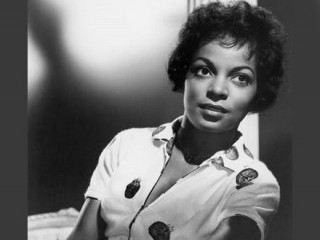
Ruby Dee biography
Date of birth : 1924-10-27
Date of death : -
Birthplace : Cleveland, Ohio, U.S.
Nationality : American
Category : Arts and Entertainment
Last modified : 2010-09-02
Credited as : Actress-poet, playwright and screenwriter, activist
3 votes so far
The early years
Ruby Dee was born Ruby Ann Wallace on October 27, 1924, in Cleveland, Ohio. Her parents, Marshall and Emma Wallace, moved the family to Harlem in New York City when Dee was just a baby. In the evening Dee, her two sisters, and her brother read aloud to each other from the poetry of Henry Wadsworth Longfellow (1807–1882), William Wordsworth (1770–1850), and Paul Laurence Dunbar (1872–1906). As a teenager Dee submitted poetry to the New York Amsterdam News, a black weekly newspaper. Later in life, Dee admitted that during those years she was a shy girl but that she always felt a burning desire to express herself.
Pursued education
Dee's love of English and poetry motivated her to study the arts. She attended Hunter High School, one of New York's first-rate schools that drew the brightest girls. While in high school, Dee decided to pursue acting.
After graduation Dee entered Hunter College. There she joined the American Negro Theater (ANT) and adopted the stage name Ruby Dee. While still at Hunter College, Dee took a class in radio training offered through the American Theater Wing. This training led to a part in the radio serial Nora Drake. After college Dee worked as a French and Spanish translator. She knew, however, that the theater was to be her destiny.
First Broadway role
In 1946 Dee got her first Broadway role in Jeb, a drama about a returning African American war hero. There she met Ossie Davis, the actor in the title role. They became close friends and were married on December 9, 1948.
Dee's first movie was Love in Syncopation, released in 1946. In 1950 she appeared in The Jackie Robinson Story and in No Way Out. In 1957 Dee appeared in Edge of the City. Over the next decade, Dee appeared in several plays and movies including A Raisin in the Sun and Davis's play Purlie Victorious. In 1965 Ruby Dee became the first African American actress to appear in major roles at the American Shakespeare Festival in Stratford, Connecticut. Her musical satire Take It from the Top opened in New York in 1979.
Beginning in the early 1960s, Dee made numerous appearances on television including roles in the Play of the Week and in several series. In 1968 she became the first African American actress to be featured on Peyton Place. In 1970 she starred in the critically acclaimed play Boesman and Lena.
Promoting black heritage
Dee and Davis collaborated on several projects designed to promote black heritage in general and other black artists in particular. In 1974 they produced The Ruby Dee/Ossie Davis Story Hour for the National Black Network. In 1981 they produced the series With Ossie and Ruby for the Public Broadcasting System (PBS).
Dee found this work particularly satisfying because she got to travel the country talking to authors and others who could put the black experience in perspective. She believes that the series made black people look at themselves outside of the problems of racism (believing that one race is superior to another race).
Took up civil rights causes
Issues of equality and civil rights have long been a concern of Dee's. In 1953 she became well-known for denouncing (openly expressing strong disapproval) the U.S. government's decision to execute Julius and Ethel Rosenberg for wartime spying. This experience helped Dee realize that racism and discrimination (treating people differently based on race, gender, or nationality) were not exclusively black experiences.
Dee and Davis were involved in and supported several other civil rights protests and causes, including Martin Luther King Jr.'s 1963 March on Washington. In 1970 the National Urban League honored them with the Frederick Douglass Award for distinguished leadership toward equal opportunity.
In 1999 Dee and Davis were arrested for protesting the fatal shooting of an unarmed West African immigrant, Amadou Diallo, by white police officers of the New York City Police Department.
Other achievements
Dee's remarkable acting talent has endured over the years. Director Spike Lee cast Dee in his 1989 film Do the Right Thing. In 1990 Dee appeared in the television movie The Court Martial of Jackie Robinson. In 1991 Dee won an Emmy for Decoration Day, and in 1994 she appeared in the television movie version of Stephen King's The Stand.
Dee also has established the Ruby Dee Scholarship in Dramatic Art. The scholarship is awarded to talented young black women who want to become established in the acting profession. In 1988 Ebony magazine featured Dee and Davis as one of "Three Great Love Stories." Both she and Davis donate money and countless hours of time to causes in which they believe.
On March 11, 2001, Dee and Davis received the Lifetime Achievement Award from the Screen Actors Guild. At that time, they had been married and worked together for fifty-two years.
















